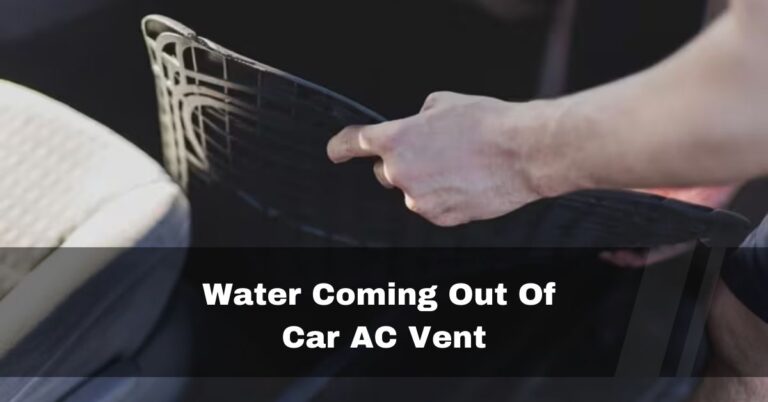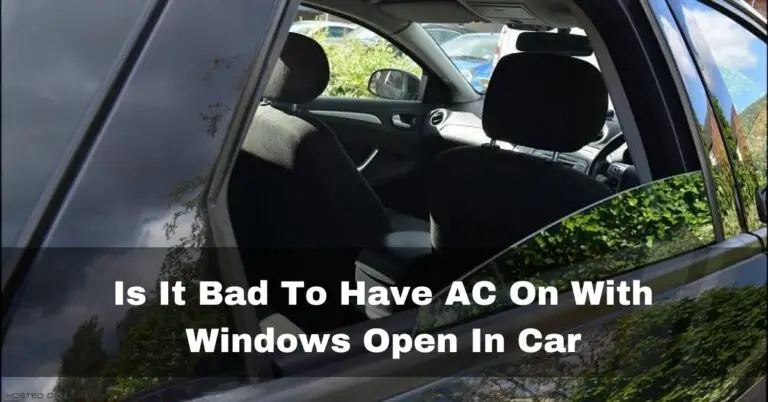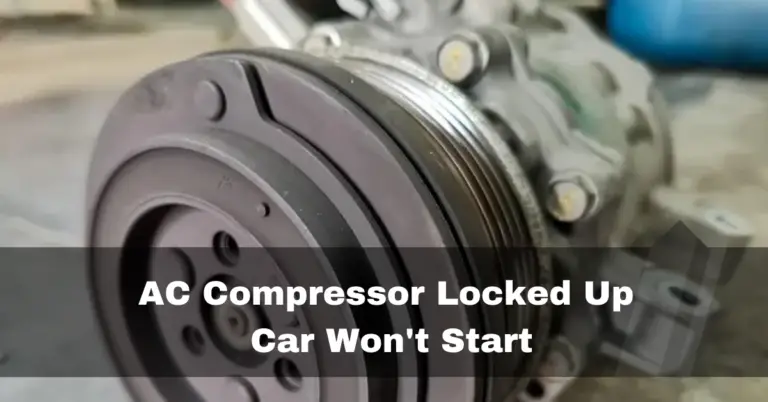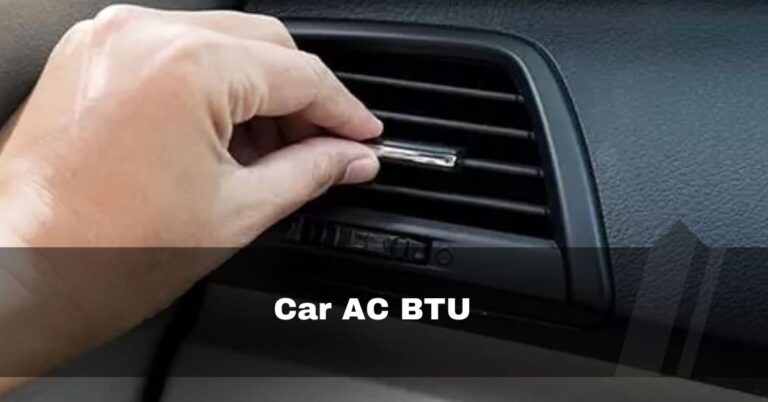AC Blows Warm At Highway Speeds – fix right now – 2023
It can be frustrating when your AC starts blowing warm air in hot summer, especially when driving at highway speeds. There are several reasons why this might occur, and understanding them can help you diagnose and address the issue effectively.
A slightly low refrigerant charge, excessively low or high pressure, evaporator freezing up, clogged condenser, failing cooling fans, and airflow restrictions will cause this.
So Stay with us; we will discuss the causes of AC blowing warm at high speeds and provide some fixes to resolve this issue.
Table of Contents
Why Does AC Blow Warm At Highway Speeds –
1. Low Refrigerant Levels:
You are low on refrigerant gas pressure within the aircon system. Low refrigerant levels are among the most frequent causes of warm air coming through your car’s AC vents. Refrigerant is the essential component that cools the air inside your air conditioning system.

Leaks or evaporation can cause refrigerant levels to decrease over time. When traveling at greater speeds, the increased cooling demand can compound the effects of low refrigerant levels, resulting in warmer air being blasted. At lower rates, the AC may still operate effectively.
2. Malfunctioning Compressor:
The compressor in charge of pressurizing and moving the refrigerant is the brains of your car’s air conditioning system. Inadequate cooling may arise from a malfunctioning compressor, especially when traveling on the highway.
A broken clutch, worn-out bearings, or electrical problems are a few examples of factors that might cause a compressor to malfunction and cause warm air to circulate.
3. Clogged Or Dirty Condenser:
The refrigerant must release heat to cool down and circulate through the system again, and the condenser does this. Warmer air will blow out the vents if the condenser is blocked or unclean, as it won’t be able to dissipate heat adequately. Highway driving can worsen the issue because the increased airflow causes more heat to be produced.

4. Failing Cooling Fans:
The cooling fans in your automobile are essential for keeping the AC system’s temperatures at ideal levels. They aid in the condenser’s cooling, guaranteeing effective heat exchange. Warm air will be blasted into the cabin if these fans aren’t functioning correctly, especially at higher speeds, preventing the condenser from doing its job properly.

5. Airflow Restrictions:
Proper ventilation is necessary for your car’s AC system to operate effectively. The system may have trouble delivering cool air at incredible speeds if the cabin air filter or air intake is blocked. The air at the vents may also be warmer due to problems with the air distribution system, such as blocked vents or broken blend doors.
6. Evaporator Freezing:
An evaporator freezing up might be caused by insufficient refrigerant levels or constrained airflow. This problem is made worse by the greater airflow experienced during highway travel, which causes the AC vents to blow heated air. Evaporator freezing prevents efficient heat transfer and cooling.

How To Fix AC That Blows Warm At Highway Speeds?
If warm air comes out of your car’s AC while driving down the highway, you might need professional help diagnosing and resolving the issue. However, there are specific actions you might take to address the problem:
1. Check Refrigerant Levels:
It’s essential to see a specialist for a thorough evaluation when there are concerns about low refrigerant levels. Potential leaks will be carefully found, repaired, and the appropriate amount of refrigerant will be added to the AC system. This careful method guarantees that the AC system performs optimally and produces the proper cooling effect.
2. Inspect The Compressor:
Seeking a mechanic’s assistance for a compressor that isn’t working is essential. Any functional difficulties with the compressor will be found during their inspection. They will suggest acceptable fixes or replacements if the need arises. Adequate refrigerant circulation and cooling efficacy depend on a running compressor.

3. Clean The Condenser:
It is crucial to keep dirt and debris out of the condenser. A thorough cleaning improves the condenser’s ability to promote effective heat exchange. A clean condenser promotes efficient cooling and keeps the system from working too hard to reach the optimum temperature.
4. Test Cooling Fans:
It is crucial to ensure the cooling fans are running without any problems. To prevent overheating, cooling fans must effectively remove heat from the condenser. For efficient temperature regulation to continue, quick repairs or replacements are essential. Faulty fans reduce the cooling effectiveness.

5. Ensure Proper Airflow:
A clear path for airflow must be ensured. Smooth air circulation is provided by inspecting the cabin air filter and air intake for obstructions. Suppose the issue affects the air distribution system. In that case, it is best to consult a professional to identify and resolve the problem and ensure the cabin is effectively cooled.
6. Fix the Evaporator Freeze:
It’s crucial to maintain proper refrigerant levels, clean air filters to preserve free airflow and check the thermostat and sensors for any issues if you want to solve this problem.

Temporarily turning off the AC can aid in defrosting a frozen evaporator. However, you need to consult a professional to receive a thorough diagnosis and the necessary repairs to return your AC system to its optimum function.
FAQs:
1. Why Does My Car AC Get Warm At High RPM?
As others have stated, the AC compressor clutch and belt are probably slipping at higher RPMs. I recommend ensuring the front of the AC compressor is running at full speed and not slowing down while the engine revs high enough to cause the AC to stop functioning correctly.
2. Why Does My AC Get Warmer When I Drive?
When the air conditioner blows hot air when you’re driving and cold air while it’s idle, you probably have a vacuum leak somewhere, which causes the vents to “defrost” instead of “people” (it’s still probably chilly, it’s just not aimed at you). If the temperature is the opposite (cold when driving, hot while idling), you should check your fans and refrigerant.
3. Why Is My AC Not Cold After Driving?
The air conditioner may not be blowing cold air for various reasons. The most frequent causes are a clogged filter, a cooling fan issue, radiator issues, or the fact that your air conditioner needs to be recharged (regassed).
4. How Do I Know If My Car AC Needs To Be Recharged?
If the air blowing out of your car is warm or hot, that may be the most straightforward sign that something is wrong with your air conditioner. The evaporator core will achieve the ideal cooling temperature if your vehicle has enough refrigerant. The air may blow warmly after beginning to cold. It might also never get cold at all.
Conclusion:
Having warm air from your car’s vents while on the highway can be annoying, but knowing the possible causes will help you deal with the problem successfully. It doesn’t matter if the issue is low refrigerant levels, a broken compressor, a clogged condenser, a failing cooling fan, or airflow constraints; if you diagnose and fix these issues quickly, your AC system will work at its best and keep you cool and comfortable even at high speeds. To thoroughly diagnose and address the problem, it is best to get the advice of a professional technician if you need clarification on how to proceed.







